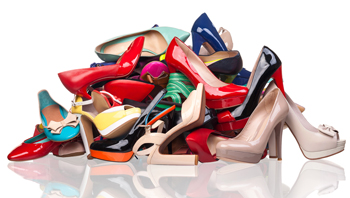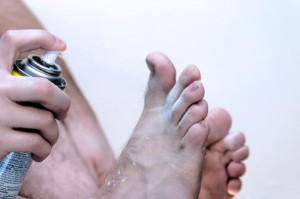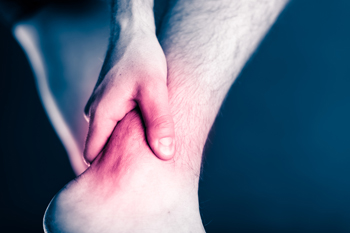 Research has indicated that when high heels are worn frequently, damage may be done to the feet. The calf muscles may become shorter, which may cause Achilles tendon injuries. Additionally, uncomfortable foot conditions may develop as a result of inadequate room in the front of the shoe for yur toes. These can include bunions, hammertoes, corns, and blisters. Many women balance the desire to wear high heels by alternating with shoes that have a lower heel. Additionally, falling may be prevented when specific foot and ankle stretches are practiced, which can help the overall foot to become stronger. If you would like more information about how the feet are impacted by high heels, it is suggested that you consult with a podiatrist.
Research has indicated that when high heels are worn frequently, damage may be done to the feet. The calf muscles may become shorter, which may cause Achilles tendon injuries. Additionally, uncomfortable foot conditions may develop as a result of inadequate room in the front of the shoe for yur toes. These can include bunions, hammertoes, corns, and blisters. Many women balance the desire to wear high heels by alternating with shoes that have a lower heel. Additionally, falling may be prevented when specific foot and ankle stretches are practiced, which can help the overall foot to become stronger. If you would like more information about how the feet are impacted by high heels, it is suggested that you consult with a podiatrist.
High heels have a history of causing foot and ankle problems. If you have any concerns about your feet or ankles, contact one of our podiatrists from Lovely Foot Associates, PC. Our doctors can provide the care you need to keep you pain-free and on your feet.
Effects of High Heels on the Feet
High heels are popular shoes among women because of their many styles and societal appeal. Despite this, high heels can still cause many health problems if worn too frequently.
Which Parts of My Body Will Be Affected by High Heels?
What Kinds of Foot Problems Can Develop from Wearing High Heels?
How Can I Still Wear High Heels and Maintain Foot Health?
If you want to wear high heeled shoes, make sure that you are not wearing them every day, as this will help prevent long term physical problems. Try wearing thicker heels as opposed to stilettos to distribute weight more evenly across the feet. Always make sure you are wearing the proper shoes for the right occasion, such as sneakers for exercising. If you walk to work, try carrying your heels with you and changing into them once you arrive at work. Adding inserts to your heels can help cushion your feet and absorb shock. Full foot inserts or metatarsal pads are available.
If you have any questions please feel free to contact our office located in Johnstown, PA . We offer the newest diagnostic and treatment technologies for all your foot and ankle needs.
 Athlete’s foot is a contagious fungal skin infection. This fungal infection typically thrives in moist, warm environments. Not wearing the proper footwear in locations such as gyms, locker rooms, public swimming pools, and communal showers may increase your risk of getting this fungal infection. There are certain symptoms that are commonly associated with this condition. These may include itchy blisters on the feet, dry skin on the soles or sides of the feet, a stinging or burning sensation between the toes, and cracking or peeling of the skin between the toes. Some patients have found antifungal powder to be helpful in trying to relieve these symptoms. For a proper diagnosis and advised plan of treatment, it’s suggested that you consult with a podiatrist.
Athlete’s foot is a contagious fungal skin infection. This fungal infection typically thrives in moist, warm environments. Not wearing the proper footwear in locations such as gyms, locker rooms, public swimming pools, and communal showers may increase your risk of getting this fungal infection. There are certain symptoms that are commonly associated with this condition. These may include itchy blisters on the feet, dry skin on the soles or sides of the feet, a stinging or burning sensation between the toes, and cracking or peeling of the skin between the toes. Some patients have found antifungal powder to be helpful in trying to relieve these symptoms. For a proper diagnosis and advised plan of treatment, it’s suggested that you consult with a podiatrist.
Athlete’s foot is an inconvenient condition that can be easily reduced with the proper treatment. If you have any concerns about your feet and ankles, contact one of our podiatrists from Lovely Foot Associates, PC. Our doctors will treat your foot and ankle needs.
Athlete’s Foot: The Sole Story
Athlete's foot, also known as tinea pedis, can be an extremely contagious foot infection. It is commonly contracted in public changing areas and bathrooms, dormitory style living quarters, around locker rooms and public swimming pools, or anywhere your feet often come into contact with other people.
Solutions to Combat Athlete’s Foot
Athlete’s foot can cause many irritating symptoms such as dry and flaking skin, itching, and redness. Some more severe symptoms can include bleeding and cracked skin, intense itching and burning, and even pain when walking. In the worst cases, Athlete’s foot can cause blistering as well. Speak to your podiatrist for a better understanding of the different causes of Athlete’s foot, as well as help in determining which treatment options are best for you.
If you have any questions please feel free to contact our office located in Johnstown, PA . We offer the newest diagnostic and treatment technologies for all your foot and ankle needs.
 Many runners experience the frustration of dealing with a sports injury that impacts their lower extremities. Whether you’re dealing with plantar fasciitis, a stress fracture, or Achilles tendonitis, it is common for an athlete dealing with a sports injury to want to continue staying in shape and being active. There are a few exercises that can help mimic the activity of running on a more low impact level. One example of this type of exercise is referred to as pool running, or aqua jogging. This activity holds the same concept as if you were on land, except you are under water. While it is low-impact, which is good if you’re dealing with an injury, it is still a high-resistance exercise. Stair walking is another low impact exercise that can help build strength as your body continues to heal. Of course it’s important to listen to your body and monitor any pain felt. For tips on how to stay active while nursing a sports injury, it’s suggested that you speak with a podiatrist.
Many runners experience the frustration of dealing with a sports injury that impacts their lower extremities. Whether you’re dealing with plantar fasciitis, a stress fracture, or Achilles tendonitis, it is common for an athlete dealing with a sports injury to want to continue staying in shape and being active. There are a few exercises that can help mimic the activity of running on a more low impact level. One example of this type of exercise is referred to as pool running, or aqua jogging. This activity holds the same concept as if you were on land, except you are under water. While it is low-impact, which is good if you’re dealing with an injury, it is still a high-resistance exercise. Stair walking is another low impact exercise that can help build strength as your body continues to heal. Of course it’s important to listen to your body and monitor any pain felt. For tips on how to stay active while nursing a sports injury, it’s suggested that you speak with a podiatrist.
Ankle and foot injuries are common among athletes and in many sports. They can be caused by several problems and may be potentially serious. If you are feeling pain or think you were injured in a sporting event or when exercising, consult with one of our podiatrists from Lovely Foot Associates, PC. Our doctors will assess your condition and provide you with quality foot and ankle treatment.
Common Injuries
The most common injuries that occur in sporting activities include:
Symptoms
Symptoms vary depending upon the injury and in some cases, there may be no symptoms at all. However, in most cases, some form of symptom is experienced. Pain, aching, burning, bruising, tenderness, tightness or stiffness, sensation loss, difficulty moving, and swelling are the most common symptoms.
Treatment
Just as symptoms vary depending upon the injury, so do treatment options. A common treatment method is known as the RICE method. This method involves rest, applying ice, compression and elevating the afflicted foot or ankle. If the injury appears to be more serious, surgery might be required, such as arthroscopic or reconstructive surgery. Lastly, rehabilitation or therapy might be needed to gain full functionality in the afflicted area. Any discomfort experienced by an athlete must be evaluated by a licensed, reputable medical professional.
If you have any questions, please feel free to contact our office located in Johnstown, PA . We offer the newest diagnostic and treatment technologies for all your foot care needs.
 Patients who are overweight may have an increased risk of experiencing ankle and foot pain. This may be a result of the excess body weight the feet must bear as everyday activities are completed. The natural pad in the heel area may become thin, and this may lead to heel pain which can be indicative of plantar fasciitis or heel spurs. People who are obese may have difficulty in performing daily exercise routines, which may contribute to the inability to lose weight. Pain may be experienced in the joints, ligaments, and muscles of the feet, and a sedentary lifestyle may be preferred. Research has indicated that foot pain may be controlled by maintaining a healthy weight, and this can be accomplished by eating healthy foods, and starting an exercise regime. If you have questions about how excess weight can affect the feet, please consult with a podiatrist.
Patients who are overweight may have an increased risk of experiencing ankle and foot pain. This may be a result of the excess body weight the feet must bear as everyday activities are completed. The natural pad in the heel area may become thin, and this may lead to heel pain which can be indicative of plantar fasciitis or heel spurs. People who are obese may have difficulty in performing daily exercise routines, which may contribute to the inability to lose weight. Pain may be experienced in the joints, ligaments, and muscles of the feet, and a sedentary lifestyle may be preferred. Research has indicated that foot pain may be controlled by maintaining a healthy weight, and this can be accomplished by eating healthy foods, and starting an exercise regime. If you have questions about how excess weight can affect the feet, please consult with a podiatrist.
The more you weigh, the harder your feet must work to support your body. If you’re an obese individual and are concerned about your feet, contact one of our podiatrists from Lovely Foot Associates, PC. Our doctors can provide the care you need to keep you pain-free and on your feet.
Obesity and Your Feet
People who are overweight are putting more pressure on their ankles, knees, and hips as well as their feet. This unfortunately can lead to variety of different issues.
Problems & Complications Stemming from Obesity
If you have any questions, please feel free to contact our office located in Johnstown, PA . We offer the newest diagnostic and treatment technologies for all your foot care needs.